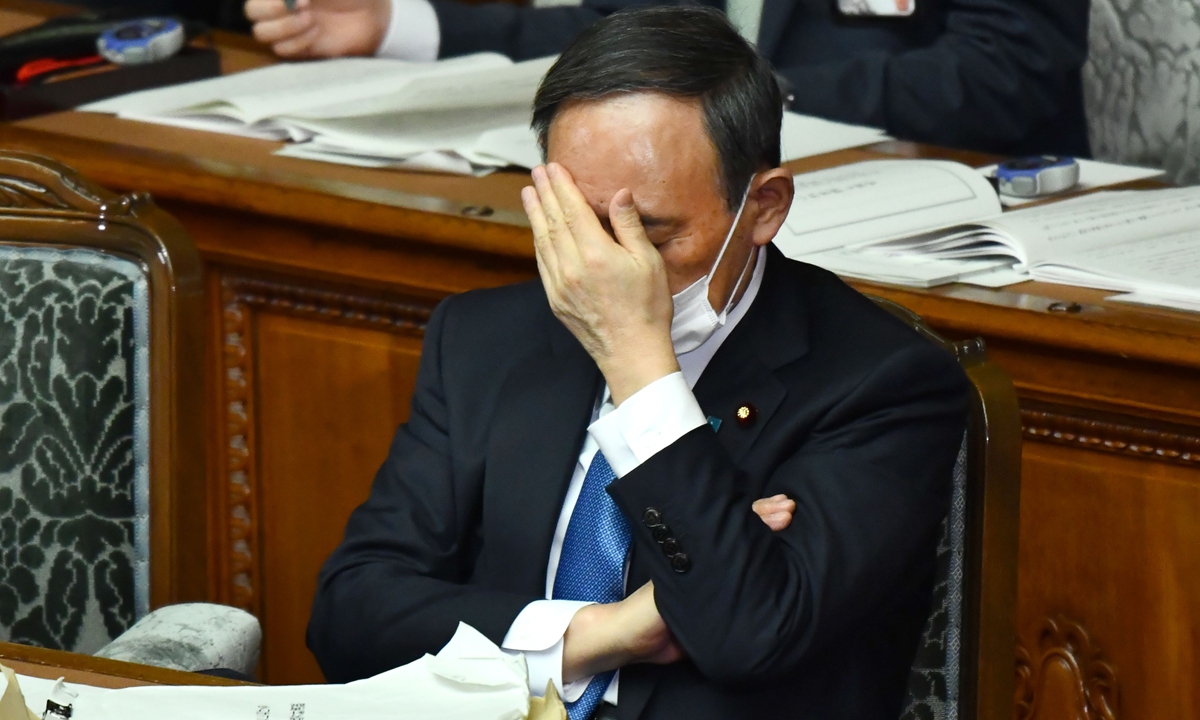-

- Cai Liang
- Senior Research Fellow
- Center for Asia-Pacific Studies
- Institute for Foreign Policy Studies

Japan's Prime Minister Yoshihide Suga gestures after delivering his policy speech at the lower house of parliament in Tokyo on Monday. Suga pledged to bring the coronavirus epidemic under control in Japan "as soon as possible" and continue preparations to host the Tokyo Olympics and Paralympics this summer, media reported. Photo: VCG
Japanese and US forces are conducting the joint Orient Shield exercise, which began June 18 and finishes on July 11. On July 1, they carried out a surface-to-air drill on a Japanese island roughly 850 kilometers from the island of Taiwan. According to Financial Times reports, the US and Japan have been conducting war games in the event of a conflict with China over Taiwan.
Orient Shield is an annual training exercise executed in Japan between the Japanese Ground Self Defense Forces and United States Army. But its scale is particularly massive this year, the largest in 36 years.
At recent international occasions, including the US-Japan 2 2 meeting in March, and Japanese Prime Minister Yoshihide Suga's US visit in April, Japan has regularly raised the Taiwan question. In the name of preserving peace and stability of the Taiwan Straits, Japan has been piling political pressure and military deterrence against China. Japan has been using the tactic of "protecting Taiwan" to conceal its own anti-China nature.
In its alliance with the US, Japan is in a vassal position, as Japan relies on the US to secure its own security. But in terms of the Taiwan question, Japan does not wish to see China realize peaceful reunification, which is consistent with US strategic interests.
Japan is not an entirely sovereign country. It has to obey the US when it comes to security affairs. In East Asia, the real destabilizing factor is the US. Unlike its multilateral alliance system in Europe, the US strategic pillar in East Asia is centered on various bilateral alliances, such as the US-Japan, US-South Korea, and US-Australia alliances. Among them, Japan is the US' most crucial ally in the region.
To coordinate US suppression of Russia, the ongoing US-Japan drill also included a live-fire exercise in Hokkaido, located in close proximity to Russia's border. Russian Foreign Ministry Spokeswoman Maria Zakharova said in a statement on Saturday that Russia considers the joint exercise through the prism of ensuring the security of its Far Eastern borders.
"We cannot but pay attention to the unprecedented scale of the maneuvers, in terms of the forces involved and the coverage of the territory of Japan," the diplomat said.
From the perspective of Japan's own interests, Tokyo has always viewed Moscow as a threat— two are also still mired with territorial disputes over the Southern Kuriles, claimed by Japan as the Northern Territories.
Witnessing the Russian Pacific Fleet's drills in the central part of the Pacific Ocean, which kicked off in mid-June, Japan couldn't sit still. Speaking to the US right-wing Hudson Institute think tank recently, Japan's State Minister of Defence Yasuhide Nakayama spared no efforts hyping threats from China and Russia, warning the US of a Pearl Harbor-style surprise attack— which Japan itself launched against the US at the outset of World War II.
Japan is going back to the age of McCarthyism of the US in the 1950s. In so doing, it is pulling the world and Asia back to the Cold War era, and dividing globalization into a China-Russian camp and a US-Japan camp. Japan flaunts itself on the values of so-called liberal democracy. While it panders to the US, it also tries to stabilize the right-wing in the country for the upcoming elections.
However, a simultaneous hostile relationship with both China and Russia would put Japan in a vicious circle, making it more dependent on the US. Worse, Washington can offer Tokyo nothing more than a verbal guarantee of security.
Japan is well aware that the US wants to play the Taiwan card to contain China's development. And the US cannot afford a war with China. If the US succeeds in slowing down China's 20 years of growth, Washington and Tokyo think this will be beneficial to their national interests. Therefore, Beijing should not be tricked by Washington and Tokyo. In fact, Beijing should continue to adhere to the peaceful reunification strategy. China can also conduct similar military drills and send warplanes to the Taiwan Straits as a deterrent to the US and Japan and to clarify its red line. It is precisely because that China is a big country, the US and Japan are playing such tricks over the Taiwan question. Therefore, China must maintain its strategic resolve.
China and Russia have decided to extend the China-Russia Treaty of Good-Neighborliness and Friendly Cooperation. In the context of international confrontation, China and Russia together will become the dominant force in maintaining regional stability and counteracting the provocations of the US and Japan.
Source of documents:Global Times, July 4
